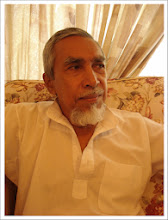1. As I’ve mentioned earlier, my father’s appointment as
translator had brought him good luck in his career. He had started the work of
translating the Enactments as early as 1922 when he was the Assistant
Superintendent Monopolies and Customs in Sungai Petani. His earliest work was
probably the translation of the Arms Enactment, the Customs Enactment and the
Arbitration Enactment. These were completed in December 1922 for which he was
paid a bonus of $100 rial.
2. At that time he was caught in a tug-of-war between the
British Adviser (Adviser) and the State Council. The Adviser was keen for him
to be seconded to the Legal Adviser’s office so that he could carry out the
translation work without much interference. However, the Adviser had discovered
that he felt it a downward step to be transferred to work as a mere translator
and thus the public would think that he had been degraded.
3. To the Adviser’s mind, my father’s thought was baseless on
account of the fact that the work was of great magnitude and could only be done
by a qualified person. In order to encourage him the Adviser suggested that his
transfer be described as “seconded to act temporarily as Assistant to the Legal
Adviser.”
4. However, the State Council did not fully support the idea,
so it was agreed that he should assume duty as Assistant Superintendent
Monopolies and Customs in Sungai Petani and do in addition the special
translation work for the Legal Adviser (L.A.). For that he would receive a
special allowance in addition to his ordinary pay.
5. The L.A. was not satisfied with the arrangement. In a
letter to the Adviser he stated that it had entailed undue delay. The L.A.
noted that my father was burning the candle at both ends. As the latter seemed
to be spreading himself too thin, the L.A. argued that the arrangement was
neither satisfactory to the Superintendent Monopolies nor was it to himself.
6. In his letter, he enclosed a statement showing a list of Enactments
and rules which awaited drafting. He pointed out that some of the 27 items on
the list need to be translated very urgently and noted that the list would
certainly continue to be added to. He stated that if he were to have a
competent assistant then his assistant would be fully employed to do the
translation work and other related duties.
7. On account of the urgency of the matter, the State Council in
its sitting on 7th October 1923 had decided on the secondment of Che
Ismail Merican temporarily to the L.A.’s office to assist him in the
translation work and in consequence the transfer of officials affected by the
secondment.
8. Thus in November 1923, my father opened a new chapter in his
career. He was fully occupied with the load of translation that had to be done.
Apart from the translation and
checking, he also helped to transcribe into ‘Roman’ characters, as well as translate
into English, the records of cases sent up to the Court of Appeal.
9. On account of his
hard work and dedication, he gained the confidence and won the favour of his
superior. In January 1924, the L.A. in his letter to the Adviser put forward a recommendation
that the post of Assistant to the L.A. be made a Class III appointment and that
Mr. M.I. Merican be posted to that appointment. Regarding the merits of the
latter, the L.A. commented inter alia:
As to the merits of this case, apart from his length of service (13 years) and age (42 years old), I have been much impressed by Mr. Merican’s zeal and ability and the high quality of his work speaks for itself.
10. Consequently, the State Council in its sitting on 6 March 1924
had decided in accordance with the recommendation.











No comments:
Post a Comment